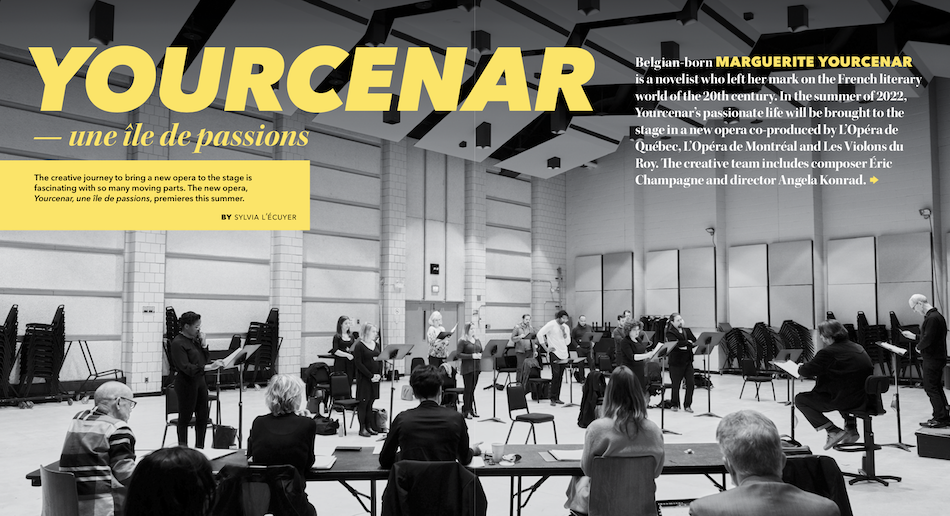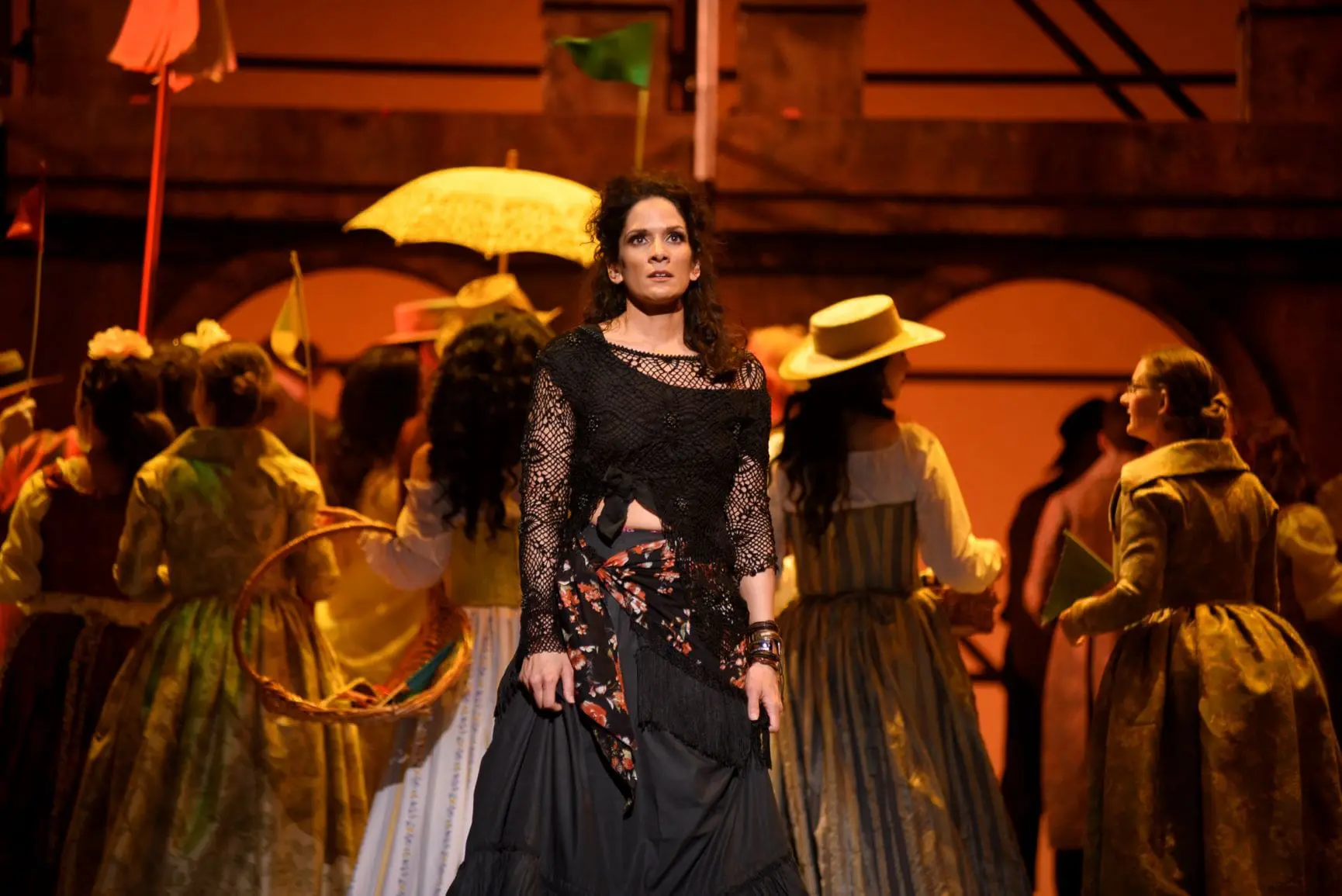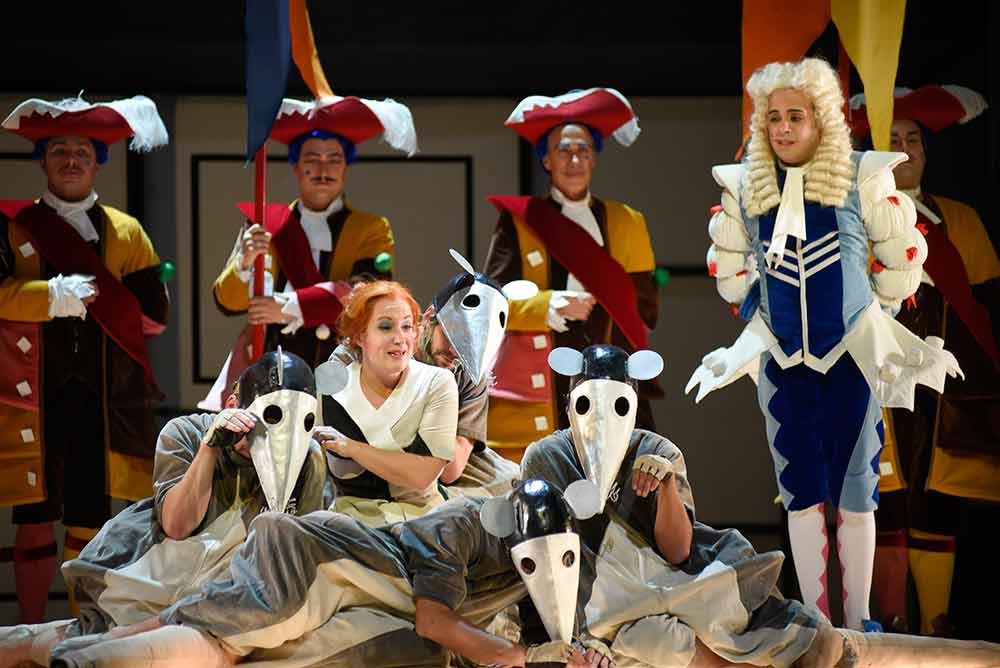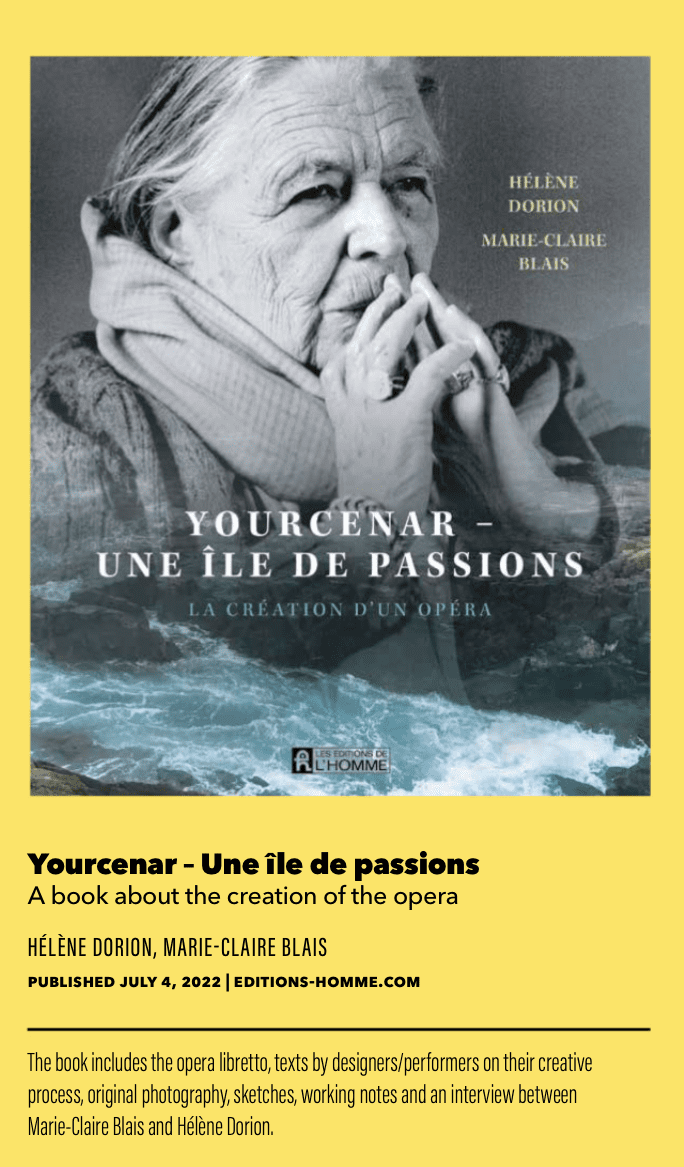
*this text was originally published in the summer 2022 print version of Opera Canada magazine
Belgian-born Marguerite Yourcenar is a novelist who left her mark on the French literary world of the 20th century. In the summer of 2022, Yourcenar’s passionate life will be brought to the stage in a new opera co-produced by L’Opéra de Québec, L’Opéra de Montréal and Les Violons du Roy. The creative team includes composer Éric Champagne and director Angela Konrad.
But remarkably the impetus for this new work can be traced to the passion and enthusiasm of librettist Hélène Dorion, who shares with her friend and co-librettist Marie-Claire Blais, an unbounded admiration for Yourcenar, the first woman elected to the Académie Française in 1980.
Hélène Dorion is a poet, novelist, essayist and a long-time lyricophile. In 2016, at the invitation of Opéra de Montréal, Hélène agreed to become ‘librettiste d’un soir’. The challenge was to choose a well-known opera aria and give it new life by replacing the original lyrics with a new text of her own. In her own poetic way, she described what the music brought to her words: “It was as if you had placed a piece of wood on a stream and the water just carried it away.” After such a moving experience, she says she could picture herself writing an opera especially because she enjoys collaborating with artists from different disciplines.
During one of her frequent visits to her friend, novelist Marie-Claire Blais, Hélène described her opera project. “It will be freely inspired from the life and works of Marguerite Yourcenar, an author I have been passionate about for a long time.” Blais’s reaction was immediate:
“I will write it with you!” Born in Québec in 1939, Ms. Blais earned many of French literature’s highest international awards for her fiction, nonfiction, and stage works, in addition to being regularly nominated for the Nobel Prize. On November 30, 2021, an unexpected and dramatic event happened: Marie-Claire died suddenly. Hélène was left to carry the project forward with the production partners.
Marguerite Yourcenar’s best known novel, Les Mémoires d’Hadrien, published in 1951, was an immediate success and has become a modern classic (as well as the subject of an opera by Rufus Wainwright, premiered at the Canadian Opera Company in 2018). Her literary output of poems, essays and novels spans six decades of her life and includes her own Memoirs, the third volume of which was left unfinished when she died in 1987. Both Hélène and Marie-Claire were quite naturally fascinated by how Yourcenar sought to fulfill her writerly ambitions through self-discipline, maintaining a stable relationship, and through solitude—a distance from the hubbub of urban life. At the same time other interests such as her love of travel, of nature and ecology, her militant activism for social justice, and her interest in both the Ancient Greeks and Negro spirituals, were pulling her in many different directions. “Marguerite Yourcenar represents a global village,” says Hélène, who believes there is enough dramatic tension in this writer’s life from which to fashion an opera. But she insists that while the opera is not fiction, nor is it merely a biopic with music and staging. “Everything is true,” she states, “but everything is invented”.
Marguerite Cleenewerck de Crayencour was born in Brussels in 1903 and adopted the anagram Yourcenar as a pseudonym for her first novel, Alexis, in 1929. After a few years of bohemian life, she met Grace Frick, then professor of British literature in New York, who became her companion. In 1939, Grace invited her to the United States to escape the outbreak of the war. They lived first in Hartford, Connecticut and then in a house called Petite Plaisance on Mount Desert Island in Maine until Grace’s death of breast cancer in 1979. The last part of her life was divided between writing in the isolation of Petite Plaisance and long journeys abroad. She traveled around the world with the young American director Jerry Wilson, her lastsecretary and companion, with whom she had a tormented relationship. Jerry died of AIDS in 1986 and Yourcenar died the next year. She was buried alongside Grace in a cemetery close to their little house which is now a museum.
When Éric Champagne was invited to write the score for this opera, he confessed it was unexpected. “I took on a project already in motion and what ignited my interest above all, is that I knew Yourcenar.
I had read her books and I felt that there was a bond which united us. What initially made my head spin was the scale. I had only written small-format chamber operas, both in duration and in orchestration. This is on a grander scale. And then the schedule was quite tight!’’
Indeed! The first copy of the libretto was only delivered to Éric last December. The orchestra for the project, the Québec-based string orchestra Les Violons du Roy, was already on board. Champagne added a wind quintet and percussion, to provide a wider range of orchestral colors, while remaining within the chamber format for a total of 21 musicians.
The casting was obvious: “I hear Marguerite as a mezzo. We have recordings of interviews with her, and she speaks in a lower, more subdued tone of voice. Grace is a soprano for a musical reason: it allows for a beautiful contrast between the two main characters and the possibility of duets. The casting of Jerry as a baritone and Daniel, his lover, as a tenor were similarly obvious. In addition, the libretto calls for ‘a soprano opera singer’ as well as a chamber choir of 12 mixed voices.
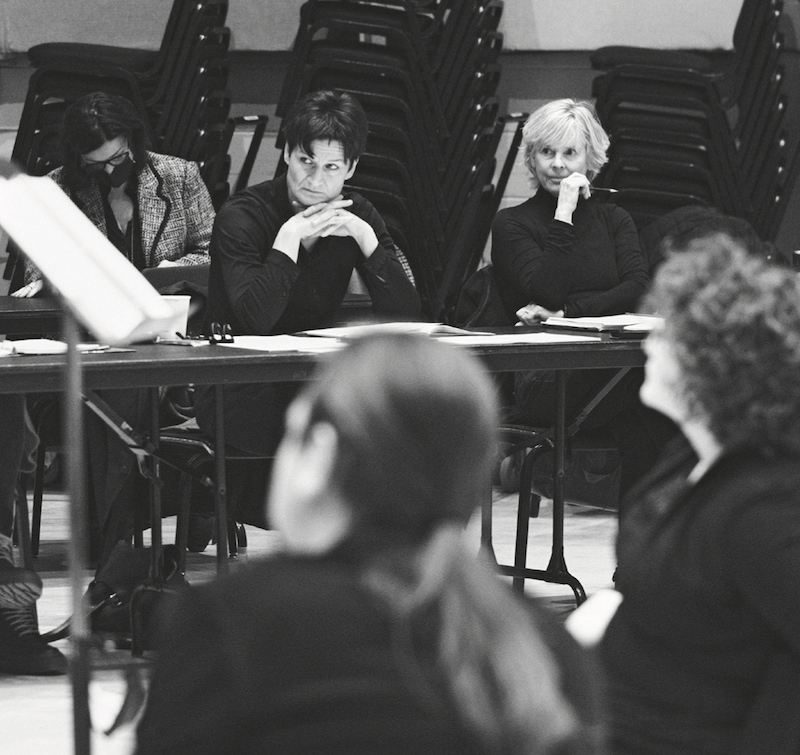
Director Angela Konrad and librettist Hélène Dorion in rehearsal in December 2021 © VIVIEN GAUMAND / ÉDITIONS DE L’HOMME
In crafting a musical signature to each of the characters, Champagne was inspired by the fact that Yourcenar’s name was an anagram. “Just as she created her name and her world, I created the characters in the same way. I used musical anagrams. I wrote an alphabet, aligned it with a chromatic scale, and by playing with the letters, I created patterns that I associated with the names of Marguerite, Grace, Jerry, and Daniel, which served as my basic material. Éric Champagne’s music is mainly melodic. “Sometimes I use tonality, at other times modality or artificial modes like Messiaen or Scriabin. The melody is what interests me when I listen to music, so it’s the param- eter that I want to work on. My ideal is to reconcile the melodic features of the vocal line with much more contemporary mate- rial in the orchestra.”
We discussed many aspects of the libretto. The chorus is very present in the Prologue for example, and Champagne chose to treat it as an oratorio chorus. There will be a music box since one was playing at the time of Grace’s death. The biography does not mention specifically what was playing but it could have been Haydn, so Éric wrote a Haydn pastiche. A pre-recorded voice intervenes in moments that are essentially literary, for example when Yourcenar is writing the Mémoires d’Hadrien. The recorded text is read over music which is integrated into the plot of the opera. It is a kind of mise en abyme of the creating process taking place as a work is being written. There is a moment in the second act when the ‘soprano opera singer’ performs ‘a famous opera aria’. Director Angela Konrad suggested “Vissi d’arte”. So, Champagne made a pastiche of it on the text ‘I lived for art’. The music is inspired by Puccini’s aria, using the same harmony.
 Angela Konrad joined the production team at the invitation of Les Violons du Roy in the spring of 2020. Born in Germany, she had worked in France for twenty years before moving to Montreal in 2011 where she founded her own theater company La Fabrik. Very well regarded for the audacity and rigor in her adaptations of great classical and contemporary texts, she has demonstrated a keen interest in music. She is open to all musical styles and getting into opera was a logical step for her to take.
Angela Konrad joined the production team at the invitation of Les Violons du Roy in the spring of 2020. Born in Germany, she had worked in France for twenty years before moving to Montreal in 2011 where she founded her own theater company La Fabrik. Very well regarded for the audacity and rigor in her adaptations of great classical and contemporary texts, she has demonstrated a keen interest in music. She is open to all musical styles and getting into opera was a logical step for her to take.
Yourcenar will be Ms. Konrad’s first operatic work. “I discovered opera as a student in Munich and my first aesthetic shock was Edita Gruberova in Lady Macbeth.” Among the complexities of the work are its constant changes of setting, both in time and in geographical space. In the working sessions with Hélène and Éric, Angela says that from time to time that she would need to ask for a few more bars of music to give the characters more time to get from A to B, in Grace’s death scene for example. “We need silence. Silence at the opera is an incredible suspension.”
Another big challenge is to deal with an orchestra and a chorus of twelve singers on stage with the soloists. In this heavily populated universe, how can the director create a space in which intimate relation- ships can fully exist? “It’s a constraint that I had to accept. Despite everything, you must create a scenic space that can accommodate emptiness, because emptiness is to space what silence is to music.”
Ms. Konrad immersed herself in Yourcenar’s writings, and specifically Alexis ou le Traité du vain combat where the narrator is a young pianist. He talks about his relationship to music, and the fact that music speaks to us of limitless possibilities. “Alexis says that it is dangerous to expose oneself to emotions in art when one has resolved to abstain from them in life. There is something about this that is very clear to me, that I understand very well. I understand a bit through these lines what many people experience through opera, this exaltation. Opera embodies passion while transcending it.’’
It is a very dedicated and talented team of creators who is set to bring back Marguerite Yourcenar to life on stage this summer. Yourcenar, une Île de passions will be presented in Québec (July 28-30) and Montreal (August 4-6).
Opera Canada depends on the generous contributions of its supporters to bring readers outstanding, in-depth coverage of opera in Canada and beyond. Please consider subscribing or donating today.

